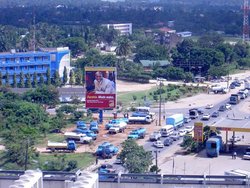Guardian (Tanzania) | 21 November 2011

BY DEVOTA MWACHANG`A
Lack of coordination between land different authorities has been cited as among the factors contributing to land grab in the country.
This was said in Dar es Salaam at the weekend by a don from the School of Real Estate Studies, Ardhi University, Prof Joseph Kironde, at a seminar on analysis and measures to curb land grab in Tanzania.
“The problem of land grab in Tanzania has been contributed by lack of coordination between the central government, district authorities, conservation agencies and Tanzania Investment Centre (TIC),” Prof Kironde said.
Presenting his paper on Land grab in Africa: Policy, Legal and Institutional hiccups in Tanzania, Prof Kironde said the agencies and authorities engaged in large-scale land acquisition processes without proper co-ordination.
“The problem of land grab will be eliminated if each agency played its part effectively since village authorities have powers to allocate land under the Village Land Act, 1999. The Commissioner for Land has similar powers and indeed he can convert village land into general land, while TIC can also allocate land to investors,” he noted.
He explained that overlapping responsibilities among various agencies and government institutions created inefficiency.
According to Prof Kironde, most villagers usually complain about being not involved in decision-making processes and kept in ignorance until it was too late to intervene.
Additionally, he claimed that there was generally lack of transparency on how land was allocated to investors while transparency should be a key principle in managing large-scale land acquisitions.
For his part, Bagamoyo Land, Natural Resources and Environment officer Michael Mlyambongo said lack of awareness on the Land Act, 1999 and un-surveyed land had contributed to land grab.
He mentioned that Makurunge and Mapinga areas in Bagamoyo had been affected by rampant land grab which caused conflict among livestock keepers and farmers because the areas were not allocated land for specific activities for instance, grazing, farming or building.
The chairman of the meeting, who is also a lecturer at Ardhi University, Prof Eugene Silayo, said people did grab land and sometimes traded in land by selling it to each other without been questioned due to policy weaknesses in the Land Policy, Land Act and lack of land administration.

There is generally a lack of transparency on how land is allocated to investors. (Above: Dar es Salaam)
BY DEVOTA MWACHANG`A
Lack of coordination between land different authorities has been cited as among the factors contributing to land grab in the country.
This was said in Dar es Salaam at the weekend by a don from the School of Real Estate Studies, Ardhi University, Prof Joseph Kironde, at a seminar on analysis and measures to curb land grab in Tanzania.
“The problem of land grab in Tanzania has been contributed by lack of coordination between the central government, district authorities, conservation agencies and Tanzania Investment Centre (TIC),” Prof Kironde said.
Presenting his paper on Land grab in Africa: Policy, Legal and Institutional hiccups in Tanzania, Prof Kironde said the agencies and authorities engaged in large-scale land acquisition processes without proper co-ordination.
“The problem of land grab will be eliminated if each agency played its part effectively since village authorities have powers to allocate land under the Village Land Act, 1999. The Commissioner for Land has similar powers and indeed he can convert village land into general land, while TIC can also allocate land to investors,” he noted.
He explained that overlapping responsibilities among various agencies and government institutions created inefficiency.
According to Prof Kironde, most villagers usually complain about being not involved in decision-making processes and kept in ignorance until it was too late to intervene.
Additionally, he claimed that there was generally lack of transparency on how land was allocated to investors while transparency should be a key principle in managing large-scale land acquisitions.
For his part, Bagamoyo Land, Natural Resources and Environment officer Michael Mlyambongo said lack of awareness on the Land Act, 1999 and un-surveyed land had contributed to land grab.
He mentioned that Makurunge and Mapinga areas in Bagamoyo had been affected by rampant land grab which caused conflict among livestock keepers and farmers because the areas were not allocated land for specific activities for instance, grazing, farming or building.
The chairman of the meeting, who is also a lecturer at Ardhi University, Prof Eugene Silayo, said people did grab land and sometimes traded in land by selling it to each other without been questioned due to policy weaknesses in the Land Policy, Land Act and lack of land administration.












